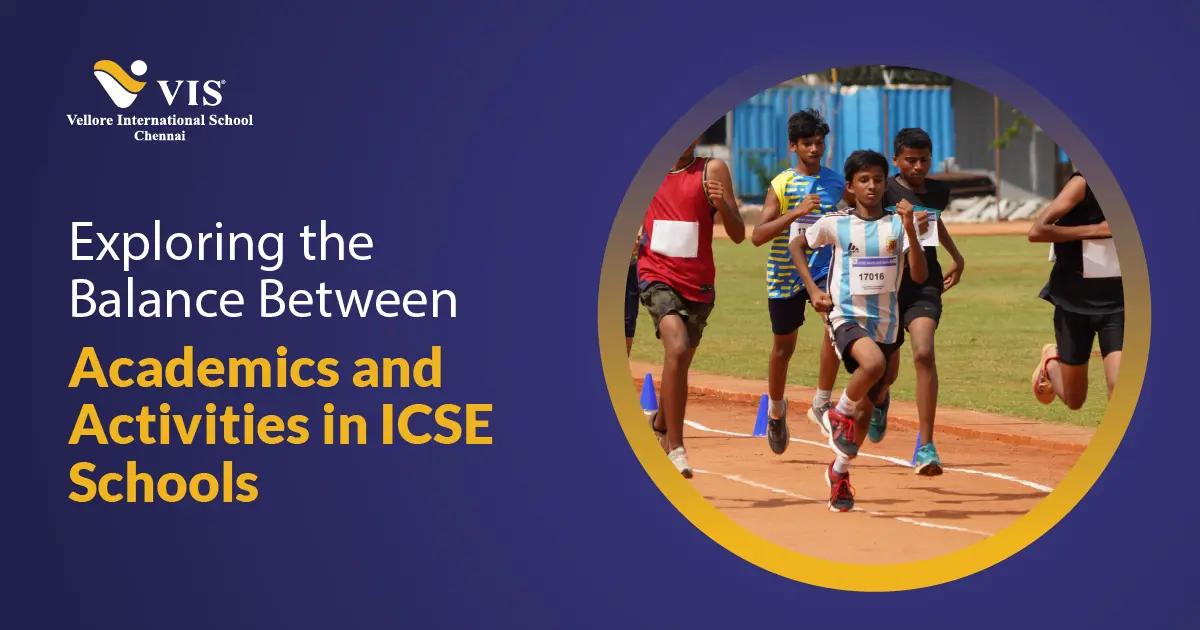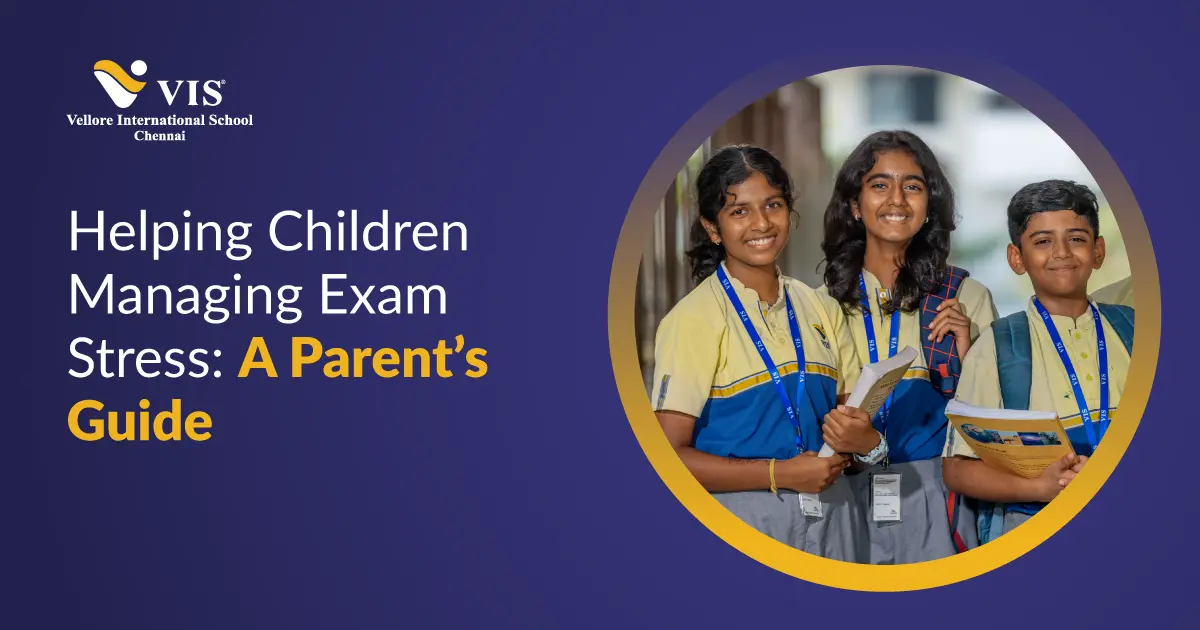What makes children’s personalities so vibrant, their confidence so inspiring, and their achievements so well rounded? The answer often lies beyond textbooks, in extra curricular activities for students.
These activities are powerful experiences that shape character, leadership, and future success. In this blog, we’ll explore why joining extra curricular activities can truly transform a student’s life, socially, emotionally, and academically. Let’s dive in!
Reasons for Students to Participate in Extracurricular Activities
1. Building Holistic Personalities
The primary reason schools encourage extra curricular activities for students is to nurture healthy individuals. While academic subjects build intellectual abilities, activities like music, drama, art, sports, or debate shape emotional intelligence, teamwork, and leadership.
- Standing on stage for a debate or dance performance helps students overcome stage fright and express themselves clearly.
- Playing a sport or organising a club event builds collaboration and mutual respect.
- Art, music, coding clubs, and science fairs encourage students to think differently and explore their imagination.
These experiences enrich a child’s personality in ways that textbooks alone never can.
2. Enhancing Academic Performance
Surprisingly, students who participate in extra curricular activities for students often do better academically than those who don’t. That’s because extracurriculars teach valuable habits like time management, goal setting, and perseverance.
For example:
- A student who juggles academics with theatre rehearsals learns how to manage deadlines more efficiently.
- Sports teach discipline, which translates into structured study habits.
- Music and art improve concentration and reduce stress, helping students focus better during exams.
Extracurricular involvement doesn’t compete with academics, it complements them beautifully.
3. Developing Social Skills & Friendships
School life is also about friendships, communication, and learning to work with others. Extra curricular activities for students provide the perfect setting for building these interpersonal skills.
- Clubs bring together students with shared interests, creating strong bonds.
- Debating societies, theatre, or student councils sharpen public speaking and negotiation abilities.
- Leading a house team or organising a school fair allows students to practice decision making, delegation, and conflict resolution.
These social skills become lifelong assets, benefiting students in universities, workplaces, and beyond.
4. Discovering Passions and Talents
Many students uncover their hidden talents through extra curricular activities for students. A shy student may discover a flair for drama, while another might fall in love with robotics, photography, or athletics.
Extracurriculars give students a safe environment to experiment, explore, and grow. They may find:
- A future career path (e.g., someone who loves debate might pursue law).
- A lifelong hobby that brings joy and balance.
- A unique identity that sets them apart from the crowd.
This self discovery is essential during the school years when students are still exploring who they want to become.
5. Building Resilience and Character
Life is full of challenges, and extracurriculars are an excellent training ground for resilience. When students commit to extra curricular activities for students, they face situations like losing a match, forgetting lines on stage, or struggling to master a skill.
These experiences teach:
- Perseverance: Not giving up after failure.
- Adaptability: Learning to adjust strategies and keep moving forward.
- Humility & Sportsmanship: Handling both victory and defeat with grace.
Such character traits cannot be memorised from a textbook. They’ve lived and learned through real experiences.
6. Preparing for Future Careers
Colleges and employers look for more than just marks. They value balanced individuals who have initiative, leadership skills, and real world experiences. Students who actively participate in extra curricular activities for students often have:
- Stronger resumes and college applications.
- Impressive portfolios showcasing leadership or creative achievements.
- Networking opportunities through clubs, competitions, and events.
For example, a student who leads the environment club demonstrates commitment, organisational skills, and leadership.
7. Improving Time Management and Discipline
Balancing schoolwork with extracurriculars may sound tough, but it’s actually a fantastic life lesson. Students involved in extra curricular activities for students learn to:
- Prioritise tasks effectively.
- Manage their schedules independently.
- Set realistic goals and meet deadlines.
These habits help in school and prepare students for university life and future careers, where time management is crucial.
8. Supporting Mental Health and Reducing Stress
Mental health among students is becoming an important topic. Participating in extra curricular activities for students provides a healthy outlet for stress and anxiety. Activities like dance, sports, music, and art act as emotional release valves.
- Sports and yoga boost endorphins, improving mood and concentration.
- Painting, drama, and music help students express emotions positively.
- Clubs provide friendships that act as emotional support systems.
This balanced lifestyle can significantly reduce burnout and promote overall happiness.
9. Encouraging Leadership and Initiative
Leadership isn’t taught, it’s experienced. Extracurricular platforms give students a stage to step up and take initiative. If leading a school club, planning an event, or mentoring juniors, students involved in extra curricular activities develop essential leadership qualities early on.
They learn:
- How to communicate ideas clearly.
- How to motivate teams.
- How to take responsibility and solve problems.
These leadership lessons stay with them throughout their lives.
10. Becoming Independent and Responsible
Extracurricular involvement encourages students to take ownership of their activities, deadlines, and outcomes. If they’re managing club funds, organising a performance, or training for a tournament, students learn responsibility through action.
Extra curricular activities for students are essentially mini-versions of real life responsibilities, preparing them for adulthood in a safe, structured environment.
Long Term Benefits of Extracurricular Involvement
The influence of extracurricular participation goes far beyond school life. It shapes who students become as adults.
A) Better adaptability:
Students who participate in varied activities learn to adapt to change, handle new environments with ease, and thrive in unfamiliar situations. This flexibility becomes a major asset in higher education and dynamic workplaces.
B) Higher self-awareness:
Through continuous involvement, students discover their strengths, passions, and areas for growth early on. This clarity helps them make informed career and personal choices.
C) Expanded networks:
Extracurriculars help students build genuine friendships, mentorships, and professional networks that often support them later in life, opening doors to opportunities.
D) Creativity:
Exposure to diverse experiences encourages innovative thinking, problem solving, and the ability to view challenges from multiple perspectives.
E) Stronger leadership:
Regular participation nurtures responsibility, confidence, and empathy, turning students into sensible leaders who inspire others.
These long term advantages stem from the simple yet impactful habit of joining and committing to extra curricular activities for students, creating future ready individuals.
Shaping Future Leaders: Vellore International School’s Extracurricular Edge
At Vellore International School (VIS), extracurricular participation is woven into the very fabric of school life. Our school believes that extra curricular activities for students play a central role in building confidence, leadership, and a sense of belonging.
From music and dance to sports, MUN clubs, robotics, and performing arts, VIS offers a diverse range of opportunities for every child to explore their interests. Our school’s education model ensures that students excel in exams and also in life skills, cultural understanding, and teamwork.
To Wrap
The benefits of extracurricular participation go far beyond what meets the eye. From academic growth and emotional well-being to leadership development and career preparation, extra curricular activities for students play a transformative role in shaping individuals.
Schools like VIS understand this deeply and integrate extracurriculars as an essential part of education. By encouraging students to explore their interests and discover their talents, these activities lay the foundation for confident, balanced, and successful individuals.
So, if you’re a parent wondering if your child should join a club, a team, or a creative workshop, the answer is a resounding YES.
FAQs
1. What are the key benefits of extra curricular activities for students?
Extra curricular activities for students build confidence, improve communication, and enhance creativity beyond academics. They help children develop teamwork, leadership, and time management skills. These benefits contribute to their overall personality and long term success.
2. How do extra curricular activities improve a student’s future opportunities?
Participation in extra curricular activities for students strengthens college applications, scholarships, and job profiles. It shows commitment, initiative, and diverse skills that stand out to universities and employers.
3. How can parents help children choose the right extra curricular activities?
Parents should observe their child’s interests and strengths before selecting extra curricular activities. Encouraging exploration without pressure helps children find activities they truly enjoy. A balanced schedule between academics and hobbies ensures consistent growth.
4. Can extra curricular activities help improve academic performance?
Yes, extra curricular activities for students indirectly boost academic results by improving focus, discipline, and critical thinking. Students learn to manage their time better, stay motivated, and develop problem solving skills that reflect positively in their studies.
5. How many extra curricular activities should a student join?
There’s no fixed number, but quality matters more than quantity in extra curricular activities for students. A child should commit to 1 – 2 meaningful activities consistently rather than juggling too many at once, ensuring deeper learning and enjoyment.


























